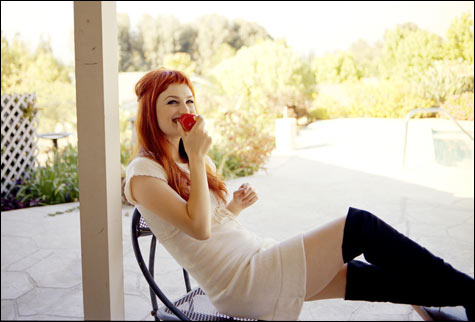
AN HONEST MISTAKE: “I wasn’t trying to write a hit or anything,” says Alison Sudol of her bedroom-penned breakthrough, “Almost Lover.” “I just needed to tell a story that meant something to me.” |
Alison Sudol, the LA-based artist who records and performs as A Fine Frenzy, just loves it when I bring up the first show of her first-ever tour. It was in Seattle — where the 24-year-old singer/pianist was born — two summers ago. Opening for Rufus Wainwright, she strode out in an elegant black dress and heels, sat at her Steinway, and played a couple of songs from her 2007 debut, One Cellin the Sea, with her backing band. Then, as she glanced out at the packed theater, she grabbed a large cup full of hot tea to take a sip . . . and spilled it.
“All over myself and my keyboard . . . yep. I was so nervous! Thanks for reminding me of that!” The amiable Sudol laughs as brightly as she can manage, given that she’s confined to her Austin hotel bed with a bad cold — inconvenient timing, since she’s just launched a US tour behind A Fine Frenzy’s sophomore Virgin LP, Bomb in a Birdcage, that’ll bring her and a band to the Paradise this Monday.
“I sort of clung to my piano for dear life before, and it was really terrifying to look at the audience,” she admits of her first go-round in the spotlight. “But the more we played, the more comfortable I got, and I started wanting to connect with the audience more.” Now she’s as apt to leap around the stage as she is to sit and caress the ivories.
This change is also evident on the new album. One Cell — a worldwide success propelled by its hit lead single, the pensive ballad “Almost Lover” — was a lovely, dreamy, irresistible affair. Pianos and strings and gauzy keyboards cuddled Sudol’s exquisite coo; fanciful imagery (inspired by her love of C.S. Lewis and Lewis Carroll) abounded inside melodically sophisticated ruminations on love, longing, and loss. Bomb in a Birdcage is edgier, with Sudol’s voice rougher and sassier in spots. On “Electric Twist,” she alludes to her coy image (“You should be wilder/You’re no fun at all”) amid the playful dance-pop rhythms, and on the anthemic showstopper “Stood Up,” her resolute, heavily reverbed exclamations are wrapped in a tempest of atmospheric guitars and dogged drumming. Even on the gentler piano-centric numbers (“Swan Song,” “The Beacon”) that could have fit nicely on One Cell, her phrasing and her delivery are bolder, more self-assured.
That growth didn’t come easily. “I think for a very small period at the beginning I was dealing with having eyes and ears on me, which I had not had before. I didn’t have any idea what people wanted from me. On the first album, I was just writing what I thought and believed, and so to suddenly try to tap into something on purpose that would do the same thing for people that I had just done accidentally before. . . . I basically gave myself the worst case of writer’s block.”